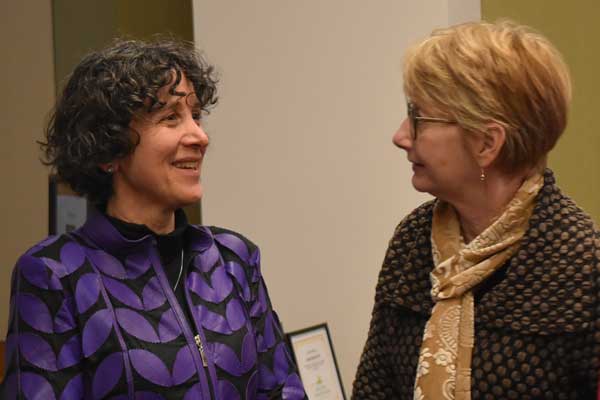Not all people experience their twilight years in the same way. Some will be hearty triathletes traveling the world and writing novels, while others will be hobbled by chronic illness and dementia. Fifteen percent of Texans — nearly four million people — are aged 65 and older, and that number is growing. By 2040, older adults will make up 22 percent of the population.
Factors such as gender, ethnicity and education level can influence both the quantity and quality of life a person can expect, as well as what resources they will have available. To improve the longevity and well-being of aging individuals across all demographics, The University of Texas at Austin will launch the Texas Aging & Longevity Center (TALC). It will be housed in the Population Research Center (PRC) and led by co-directors Karen Fingerman, human development and family sciences professor and PRC faculty researcher; and Debra Umberson, sociology professor and PRC director.
“Older adults today are breaking barriers by working longer and staying fit and involved in their communities,” says Fingerman. “But addressing optimal aging requires an adaptive society.”
TALC will coordinate events across campus, organize outside speaker series and training workshops, and hold a monthly journal club highlighting research in the field. The center hopes to bring together scholars from different fields to develop new research proposals in four core areas:
- Social Isolation and Aging in Community
- Health Disparities and Early Life Predictors of Aging
- Brain Aging
- Technology and Aging
The university has faculty and students doing innovative work on aging and longevity, but that work is spread across campus. TALC will serve as a hub for research and education on this subject and it hopes to foster more collaboration. For instance, research done by neurologists and social scientists might influence the work of technology developers and policymakers by highlighting the needs of older Americans. And community outreach might, in turn, inform research questions.
Fingerman says the center is also focused on solving problems and fears of age-related isolation, frailty and cognitive declines. “We focus on preventing these problems and optimizing engagement in late life,” she says.
In this effort, the center’s research topics complement one another. For example, people living in rural areas are more likely to experience social isolation and to suffer from dementias. And they are less likely to have access to state-of-the-art medical care or experience with web-based health resources. In addition to creating new technologies, TALC faculty assist older adults in navigating existing ones. Becoming more web savvy can allow these people to find the health-related information they need, and to better communicate with medical specialists.
Another goal of the center is providing education and training resources to scholars at all stages of their careers, including the housing of a Graduate Portfolio in Aging and Health. Those who already hold degrees may also benefit from such resources. The National Institutes of Health (NIH) recently instituted a requirement that new grants in research involving human subjects must include the entire age range, into old age. Faculty who had not previously focused on older adults will now need to learn how to conduct research in this population.
Community outreach is also central to TALC’s mission.
“We are involved with the community in a variety of ways — from urban planning to social work, internships to participation with the non-profit organization AustinUp, which aims to make Austin one of the most vibrant cities for older adults. We have spoken with entrepreneurs and businesses that hope to benefit from selling their products to older consumers” explains Fingerman. “We look forward to building partnerships that increase the health and vitality of Texas’ older population.”
Texas’ 50-and-older population is made up of growing proportions of individuals from ethnic and racial minority groups, with unique challenges, and sizeable health disparities. Additionally, aging presents increased risk of dementia, and caregiving for dementia currently costs the Texas economy billions of dollars. Understanding and addressing the best ways to age and the drivers of such disparities will be essential to improving the lives of aging Americans, UT Austin researchers say.
The Texas Aging & Longevity Center officially launched on January 25. To receive up-to-date information on happenings and research, contact aging@austin.utexas.edu to be added to the listserv.
Feature image: Co-directors Karen Fingerman and Deb Umberson at the Texas Aging & Longevity Center launch, Jan. 25, 2019. Photo by Edwin Rodriguez.
